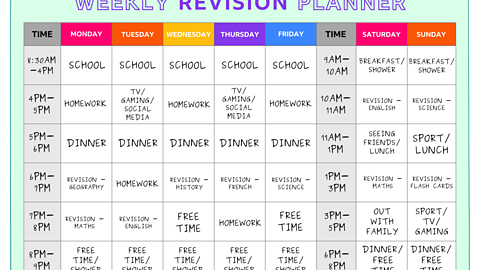It's really easy to get overwhelmed by the amount of work you have to do for your National or GCSE exams, so staying organised by planning your time and creating a revision timetable is a good idea. It can be really beneficial when it comes to keeping on top of your workload in the run up to exam season.
Our Mind Set coaches have got some great advice for how they made the most of their time when planning their revision in the run up to their exams. Watch this short video and then take a look at their revision tips below.
How to plan your time with revision timetables
Our Mind Set coaches talk you through some top tips to help you prepare for your 2024 exams.
Jacintha Make yourself a revision timetable. It's really going to help you stay on track.
Rohan Having a personalised timetable shows what you need to work on and what you need to improve on. You could have like someone else's or copy your friends', but they might do their revision techniques in a different way compared to you and having one that's personalised to you is going to be the one that you're going to stick to.
Baxter It help me to break down my subjects and then do a different topic each day. Maybe for a day I'd some parts of English, and then the next day, do maths. Focus on one thing instead of just focussing on all other stuff.
Jacintha It's so important that your revision timetable is personalised to you. For example, I like Fridays days off, so I'm going to make sure I schedule in a rest day on Friday, and I won't be doing any revision after the school day ends.
Shay My teachers in school were really helpful with planning my revision. I think it's really important to go and ask them if you have any questions about your revision or revision timetable.
Iain What I found the best thing to do was to work on your hardest subjects last, because that meant that you do the easiest ones first and you're in a good headspace and you believe that you can actually get through the day
Lauren When we got our actual timetable for our exams, I then revised in the order what the exams would be. So I think my first exam was like RE so I revised RE first and then I did like biology and stuff and just followed it chronologically.
Nung At first I did just focus on my favourite subjects, but you do need to revise equally on every single subject.
Niall I like revising in the morning and then you've got the night to relax. I would recommend doing what's right for you and what you feel kind of comfortable with, what gets you in the zone.
Iain I think one of the worst things you can do is compare yourself to others.
Joe It doesn't matter what other people do. Focus on yourself. If you take advice from someone else and you think "oh they know everything", they don't. They're in the same boat as you.
Rohan When I initially started revising, I would do like four hour chunks of like one subject. It didn't help at all because I would procrastinate, because I never dedicated a break to myself. After that, I realised I need to actually find a different technique. Having like 20 minutes of work and then a five minute break. Small chunks, but they sort of added up to a bigger amount of work that I was doing at the end of the day. It was very helpful in that aspect.
Shay I usually revise for 30 minutes at a time and then took a five minute break. Even if that was just to grab a cup of tea or go outside or just clear your head for five minutes. Something different might work for you and different timings might work better for different subjects.
Niall I crossed off my exams as I was doing them because it meant I could see how much I had ahead of me, and it meant I could keep steady through my exams.
Rohan We got given an exam timetable, which I put on my wall and I'd highlight every subject, you know, after I was finished and it felt so good coming towards the end. That last one is just so satisfying, crossing it off because you're like "finished. I'm done. No school. No more vision. I'm done!"
What our coaches say about exam timetables and planning

Focus on yourself
Using a revision timetable helped Baxter to break down his subjects and do a different topic each day. He found that focusing on one topic at a time rather than multiple subjects at once helped him better manage his time. But it's important that your revision timetable is personalised to you. Jacintha liked Fridays off, so made sure to schedule in a rest day, so didn't do any revision after school on a Friday. Joe says that everyone is in the same boat as you when it comes to revision and that it’s best to focus on yourself and not to pay attention to what other people are doing.
Choose a time of day
Niall recommends revising in a way that feels right for you and makes you feel comfortable. He says that he likes revising in the morning so that he can relax in the evening. Your timetable can be tailored to meet your needs. When Lauren got her exam timetable she made sure that she revised in the order of when her exams were. Nung focused on her favourite subjects at first, but she says that you do need to make sure that you revise equally on every single subject. Iain applied a similar approach – he found the best thing to do was to work on his hardest subjects last. That meant he did the easiest ones first and was in a good headspace.
Chunking your time to revise
How long to allocate for each revision session is another common conundrum, Rohan would do four hour chunks of one subject, but it didn't help him at all because he would procrastinate. He found that doing twenty minutes of work and then having a five minute break suited him better. Shay found doing smaller chunks of revision worked well, "I usually revised for 30 minutes at a time and then took a five minute break" he says, but he admits "something different might work for you, and different timings might work better for different subjects."
Taking breaks when studying can really help you remember more.

How to get your revision plan right using our free revision template
It's a good idea to create a revision timetable to help you make the most of your time and to ensure you've scheduled time for rest and play as well as for homework and revision. Everyone's timetable will be different, but we've created an example to give you some inspiration, and a blank template that you can use as the basis of your own. You can thank us later!
1 of 2
What is The Mind Set?
The Mind Set is two things: a series of films to help support you through your GCSEs and Nationals and a group of amazing young coaches who appear in the films.
Our coaches have been through their GCSEs or National Qualifications already. They come from all different backgrounds and all corners of the UK and they’ve all faced different challenges in getting to grips with exam revision. What they’ve got in common is that they all have heaps of exam revision tips, advice, helpful hints, hacks and wonderful words of wisdom they want to share with you.
In the series, we also hear advice from mental health professionals like Josh Fletcher (AKA “Anxiety Josh”) on how to look after your wellbeing and stay resilient during revision and exams season and we have top revision hacks from our very own memory expert, Dr Vanessa Loaiza!
Explore the Bitesize Study Support pages for more information and revision support.
This article was last updated on 12 October 2023.
If you need support
You should always tell someone about the things you’re worried about. You can tell a friend, parent, guardian, teacher or another trusted adult. If you're struggling with your mental health, going to your GP can be a good place to start to find help. Your GP can let you know what support is available to you, suggest different types of treatment and offer regular check-ups to see how you’re doing.
If you’re in need of in-the-moment support you can contact , where you can speak to a counsellor. Their lines are open 24 hours a day, 7 days a week.
There are more links to helpful organisations on ±«Óătv Action Line.
More like this
Revision: How to keep calm
Advice on how to stay calm whilst revising.

Revision: How to get organised
Advice on how to get organised with your revision.

Exams and assessments
The Mind Set coaches discuss their tips on how to navigate your exams and assessments.

